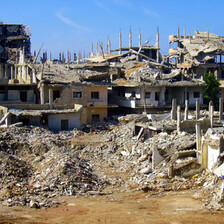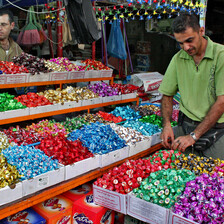The Electronic Intifada 4 June 2008
Freedom Clothing Project Ltd is a UK not-for-profit cooperative founded in 2005, comprising a small handful of friends and relations. The Electronic Intifada contributor Natasha Tsangarides spoke to project director Joe Turner about his work and the current trading obstacles:
Natasha Tsangarides: Could you tell me a little bit about Freedom Clothing and what it seeks to achieve?
Joe Turner: Freedom Clothing Project is an experiment in building a better world — I know that sounds a bit grand, but we wanted to try to make a clothing company unlike any other. It is a cooperative, so there are no shareholders, and [we are] a non-profit so we’re not primarily motivated by making money and the dream is of products that benefit those people that others ignore. It has been a long and bumpy road, but basically we went to Palestine and got a factory there to make organic cotton clothing. Later, we took another brand there, and they’re now also exporting from Palestine. It is quite a small success in the scheme of things, but we’re still dreaming and still struggling to make our dreams come about.
NT: From your experience, what are the sorts of obstacles facing suppliers when it comes to trade, exports and access to markets?
JT: Well, we all know about the checkpoints, travel restrictions and so on. These all make trade extremely difficult. But I’d say the primary barrier is emotional fatigue. For example, in the clothing sector, there used to be hundreds of small factories in the Bethlehem area alone. Of those, there are now less than a couple of dozen that survive, and a handful that are profitable. In total, there are very few sectors of the Palestinian economy that are operating as they should, and the result is high unemployment and lack of opportunity. Few now have the strength of imagination or finances to think of ways to keep going.
And the fact is that all of us who claim to be supporters of [the] Palestinians share some responsibility in that — Palestinian products should be like gold-dust around the world, we should make it a priority to support their economic intifada in any way we can. Most working businesses in Palestine are dependent directly or indirectly on Israeli trade because they have no other options to trade with.
Two examples: I once went to a factory which was making dark green uniforms. In talking to the owner, he said he thought it was eventually going to the IDF (he was subcontracting the work from an Israeli clothing company). I asked why he was doing it if that was true, and he shrugged and said he needed work to pay his employees.
[The second example, are] Jerusalem gold tiles [which] are well known in the international market. They are almost all marketed by Israeli wholesalers. Yet all the quarries are in Hebron and are Palestinian owned. This has meant that the businesses are insulated from the international market and find it extremely difficult to work directly with customers. Most do not understand the quality and customer service expected by international customers. To be fair, this is changing.
NT: On a wider scale, how has the building of the wall in the West Bank affected trade and private employment opportunities?
JT: The wall has cut off many people from their jobs in Israel. In terms of trade, it has often meant long delays in the transportation of products and the loss of customers, particularly in Israel. Given that so much of the Palestinian economy is in agriculture delays have been catastrophic. In Gaza, whilst there is a large strawberry crop, it is impossible to sell it to anyone other than the Israeli-owned monopoly Agrexco, who have special security arrangements to allow export of their products. In the West Bank, difficulties of movement mean that it is conveniently easier for shops to [stock] Israeli or foreign products than to attempt to stock products produced in other West Bank towns.
NT: Inflation is the latest problem to afflict Palestinians, with food prices rising by around five percent. How is this going to affect the private sector?
JT: Palestinian products are already very expensive on the world market due to relatively high [labor] costs. Extra costs are going to make them even less competitive. Given the stranglehold that Israel has on trade going in and out of Palestine and the extra costs of raw materials and travel, I’d say the future is bleak.
NT: Douglas Alexander, British Member of Parliament, sees the recent Bethlehem Investment Conference as a “key milestone,” arguing that “aid and development bolster the peace process.” Do you see this conference as a progressive step?
JT: It is fair to say that there are mixed feelings about the investment conference. On a very basic level, investors are going to try to limit their risk by putting money into sound businesses. Given that there are so few profitable businesses, this is likely to just make the richest men in Palestine even richer. I am not convinced that it will really help those at the bottom — who is going to invest in Palestinian handicrafts or olive oil? I guess we will have to wait to see the long term outcomes, but — along with many Palestinians — I’m not really holding out much hope.
NT: Means of resisting economic colonization are extremely difficult. How is Freedom Clothing affecting change and what responsibilities should purchasers overseas have?
JT: This is an important question and I’m not sure I can really answer adequately. Our attitude has been that it is important to bring ongoing work to Palestinian businesses and that we will try to do that in a way that helps not hurts those at the bottom of the economic pile. But the reality is that those things can be in conflict — and in an uncertain market with so few people actively attempting to buy Palestinian [products], there is little leverage to apply to affect change. I’d like to force increases in pay in the places we work, but recognize that without ongoing orders, that is unlikely to happen.
I think the main responsibility of overseas purchasers is to hold on to the hope of a better life for the Palestinians, particularly those forgotten at the bottom — which so many seem to have given up believing in — and to generate creative ideas about how to produce and sell things from Palestine that have a competitive edge. There must be many people around the world with expertise and knowledge of various markets which Palestinians could work in if they knew about it, but need help to change and help to gain knowledge of them. I often lie in bed at night and dream of a magic idea which would suddenly give Palestinians a competitive edge and [revitalize] the economy. But it hasn’t come yet.
Natasha Tsangarides is a freelance journalist based in London.
Related Links



